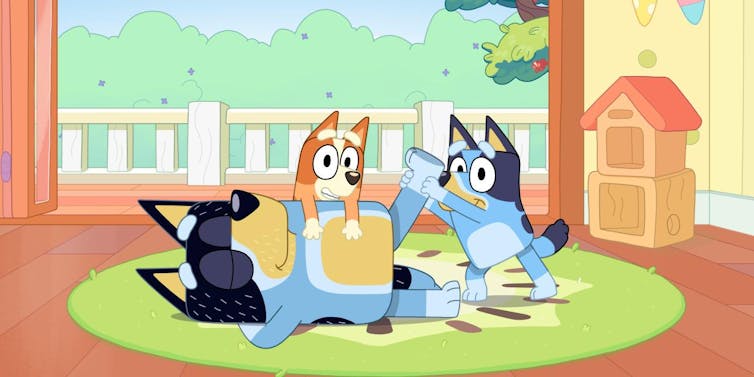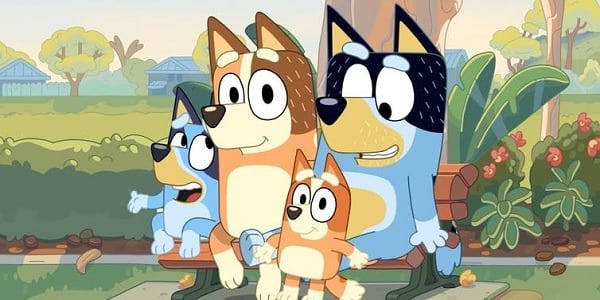Bluey is a ground-breaking Australian children’s television series and the most downloaded show in ABC iView history. Since premiering in October 2018, Bluey has been played on iView over 100 million times, and it is set to stream internationally on Disney’s streaming platform starting later this year.
The show follows the adventures of a blue heeler puppy, six-year-old Bluey, and her close-knit family: her four-year-old sister Bingo and their dad Bandit and mum Chilli. It is a gem of Australian art, carefully distilling the essence of family life and – between laughs – capturing the wonder and joy of parenting, and delivering precious nuggets of parenting wisdom along the way.
In fact, the messages the show subtly imparts are remarkably consistent with the scientific literature on parenting and parental wellbeing. Here, then, are just a few poignant examples of “Bluey” wisdom.
Play matters
Play is the powerhouse of child development. It is linked to language abilities, creativity and emotional intelligence. Parents can feel so pressured by other demands on their own and their children’s time, though, that it’s easy to forget that play is one of the most important, enriching activities needed for children to flourish. As Bandit tells his daughter, “Making up games is more important than you think”.
In fact, we are beginning to understand that play is important for adults too. Emphasising the importance of work, at the expense of play, undermines long-term achievement, health and happiness, so finding a balance is key.
Bandit and Chilli are masters at maintaining connection with their daughters, squeezing precious moments of play (like pretending to be a sick patient who has swallowed a cat or an employee who really just wants to dance) between work and household tasks. Their playfulness is clearly beneficial for them as well.
Read more:
Let them play! Kids need freedom from play restrictions to develop
Be the parent you want to be, even when you don’t feel like it
Every day, we each have to choose between taking the “easy” option – whatever makes us feel better in the moment – or investing time and energy in doing what really matters.
Psychologists describe this as living in accordance with our values. Although the easy option can bring immediate relief from feelings like sadness or anger – and, let’s face it, we all find ways to avoid negative emotions now and then – it can become a big problem when this way of dealing with challenges becomes a pattern.
Living out our values is not always easy. It can be tough, and making room for difficult emotions is part of moving towards living a meaningful life. Bluey’s parents, Bandit and Chilli, frequently give a sigh and a skywards glance before playing yet another game of “hospitals” or “hotels” with their children – it is clear that it isn’t always easy for them – yet, being a fun and playful parent is clearly a core value for both of them. So they jump right in regardless.
Emotions are opportunities for learning and connection
We can all can forge deeper connections with others – including our children – through emotional exchange: by listening to their expressions of emotion, validating their emotions and gently exploring them. This process is called “emotion coaching” and has been linked to better emotional and social skills in children.
Bandit and Chilli are master emotion coaches. Whether it is Bluey’s sorrow at the death of a bird, or her frustration while trying to learn to ride a bike, they listen, validate and explore their children’s emotional worlds through conversation or play.

IMDB
Natural and logical consequences
There’s a trap we will all fall into at some stage in our parenting careers: using a whole lot of talking to get through to our children, all the while protecting them from the consequences of their actions – and then becoming frustrated that they aren’t learning the “lesson”!
Bandit and Chilli aren’t afraid to allow Bluey and Bingo to experience the natural consequences of their own actions. For example, Bluey learns that when you spend your money on a toffee apple at the market, changing your mind about your purchase doesn’t mean you get your money back.
Bandit and Chilli skilfully demonstrate the use of logical consequences too. Logical consequences are parent-generated, but are comparable to the kinds of consequences that truly happen in the world, so children are learning a genuine and useful life lesson.
For example, in the episode “Wagonride”, when Bluey impatiently interrupts Bandit, wanting to move straight to the monkey bars, Bandit uses a logical consequence – stopping the wagon – to impart an invaluable life lesson: doing activities with other people requires give and take, and a bit of patience.
Bluey is a landmark Australian show for many reasons. But an important one is this: amid the ridiculous and the ordinary, Bluey’s parents regularly find themselves both sharing and receiving the poignant wisdom that comes with the drudgery and absurdity of parenting. And Australian parents can relate to that.
Koa Whittingham, Psychologist and Research Fellow, The University of Queensland; Amy Mitchell, Research fellow, The University of Queensland, and Ben Mitchell, Senior lecturer, The University of Queensland
This article is republished from The Conversation under a Creative Commons license. Read the original article.


